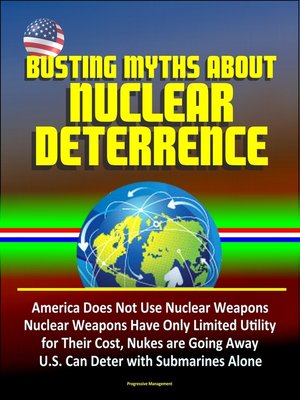Busting Myths about Nuclear Deterrence
ebook ∣ America Does Not Use Nuclear Weapons, Nuclear Weapons Have Only Limited Utility for Their Cost, Nukes are Going Away, U.S. Can Deter with Submarines Alone
By Progressive Management

Sign up to save your library
With an OverDrive account, you can save your favorite libraries for at-a-glance information about availability. Find out more about OverDrive accounts.
Find this title in Libby, the library reading app by OverDrive.



Search for a digital library with this title
Title found at these libraries:
| Library Name | Distance |
|---|---|
| Loading... |
Professionally converted for accurate flowing-text e-book format reproduction, this unique study analyzes four myths about American nuclear weapons and the nuclear deterrence they provide. America is embarked on a quest for a world without nuclear weapons, but we live in a world not yet safe from war and threats of war. Hence, as long as nuclear weapons exist, the United States must maintain a safe, secure, and effective arsenal—both to deter potential adversaries and to assure US allies and other security partners that they can count on US security commitments. Our nuclear posture communicates to potential nuclear-armed adversaries that they cannot use nuclear threats to intimidate the United States, its allies, or partners or escalate their way out of failed conventional aggression. The United States Air Force (USAF) will continue to maintain its responsibilities as steward of two of the nation's three legs of the strategic nuclear triad and the nation's associated nuclear command, control, and communications infrastructure.
Since the Cold War, three states (India, Pakistan, and North Korea) have developed nuclear-weapon capabilities, while Iran remains on course to do so. Moreover, ongoing nuclear modernization programs in China and Russia point to the continued importance of nuclear deterrence and assurance for our allies and partners. Some countries now have military doctrines that include potential first use of nuclear weapons in a militarized crisis, and these countries regularly exercise those doctrines. These threats require the United States to seriously consider its responsibility to educate and advocate for the commitment and investment needed to sustain nuclear deterrence capabilities in a dangerous world.







